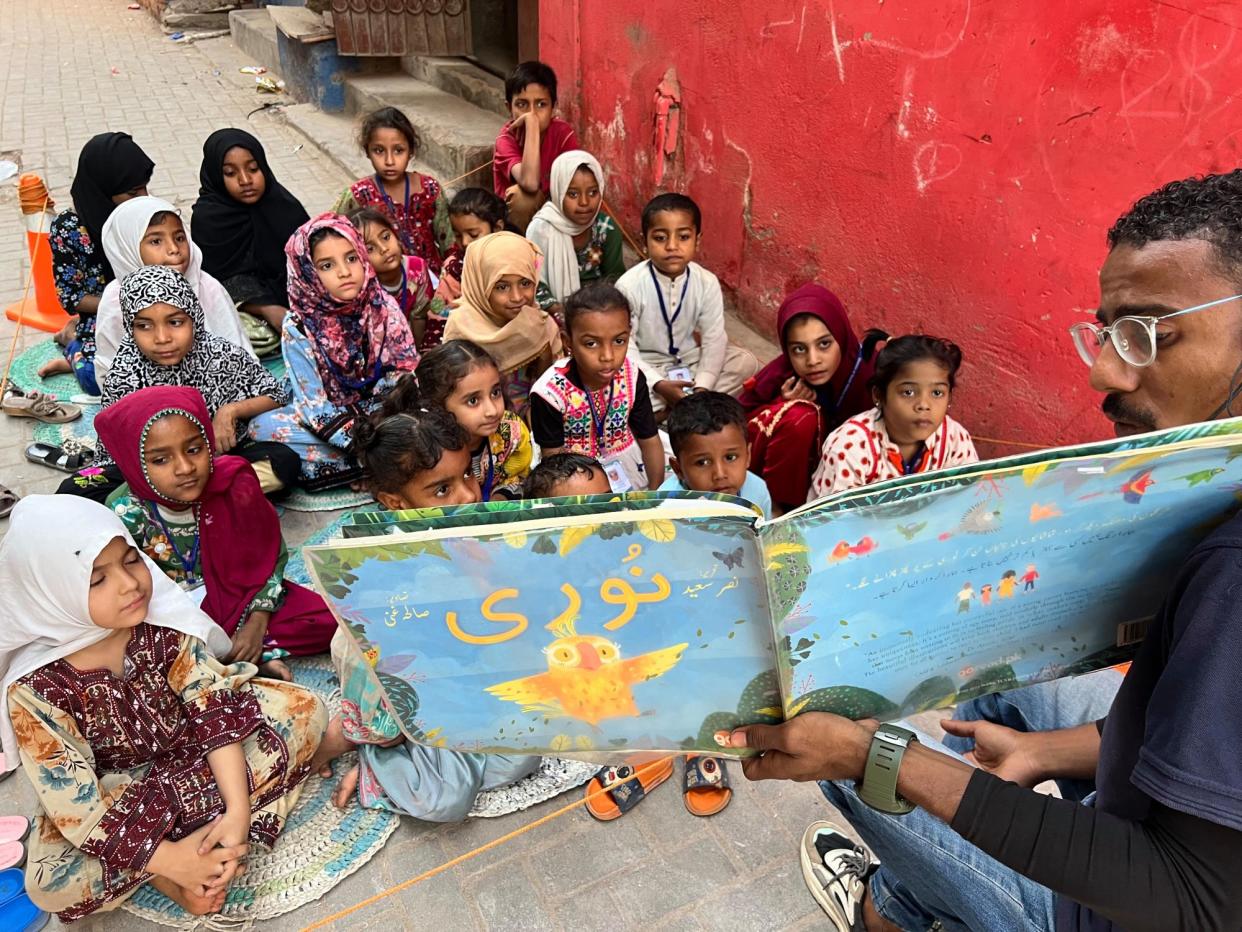Tall tales but no dessert: the storyteller of Karachi and his ice-cream cart library

Pedalling down a narrow alleyway in Karachi’s crowded Lyari Town, Saira Bano slows as she passes a group of children sitting on the ground, listening to a man reading aloud from a book. The eight-year-old gets off her bike, slips off her sandals, and sits on the mat at the back.
She has already heard the story from Mohammad Noman, who is entertaining more than a dozen children with the tale of Noori, an insecure yellow parrot. “I don’t mind listening to it again,” says Saira. “He’s so funny.”
Noman, 23, is spending two weeks in Lyari pedalling an old ice-cream cart through its lanes, stopping to read his stories and leaving behind books for the children to borrow.
I don’t mind listening to it again. He’s so funny
Saira Bano, eight
He dropped out of school himself as a teenager but has returned to education and is now studying for his high school certificate.
He is also one of two storytellers working part-time for the Kahaani Sawaari (Stories on Wheels) programme, run by GoRead.pk, which is working to improve literacy among underprivileged communities in Karachi, Pakistan’s largest city.
“I become a kid when I am around the children,” says Noman. In the past 18 months, he has visited 30 areas of Lyari, one of the most densely populated and deprived neighbourhoods of Karachi, with more than 660,000 residents, mostly from the marginalised Baloch ethnic group.
“I have learned so much,” says Noman. “It has brought a change in me as well. I’ve become more tolerant of people and developed patience. I think I have a certain rapport with children and they listen.”
Noman says he knows of children who were inspired to enrol in schools after attending his sessions.
Education is free and compulsory in Pakistan yet, according to the UN, it has the world’s second-highest rate of children absent from school, at 44% of five to 16-year-olds. And 77% of 10-year-olds are unable to understand simple text, according to the World Bank.
Books and uniforms can be prohibitively expensive in Pakistan. Saira dropped out of school a year ago when her father, who worked in a toy shop, lost his job as Pakistan’s economy was hit by rocketing food and fuel prices.
About 15,000 children have attended more than 700 Kahaani Sawaari storytelling sessions since the project was launched in 2021.
Erum Kazi, GoRead’s programme director, says parents have told her how their children have developed a love for reading since the scheme began.
“Instead of picking up bad habits – eating gutka [betel chewing tobacco] and learning abusive language – mothers said how relieved they were that their kids were spending time reading,” says Kazi.
Nusser Sayeed, GoRead’s director, is convinced that “purposeful storytelling builds a child’s character and brings out the traits for success in life”.
Sayeed, a former teacher, was inspired to set up the programme after seeing “very little joy in the lives of children studying in schools in underprivileged neighbourhoods”.
Children were growing up without anyone reading them stories, she says, adding: “We cannot expect children to read if we don’t read to them first.”
Related: Bearing gifts: the camels bringing books to Pakistan’s poorest children
It is not just children in the Lyari audience. “I have been watching this young man come in his ice-cream cart since last week,” says Rashida Ashraf, a local resident in her 60s. “He plays music, and soon the kids trickle in. There’s no ice-cream though.
“It’s nice,” she says. “It will open their minds.”


